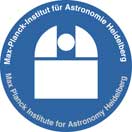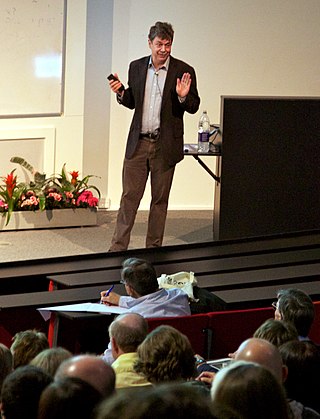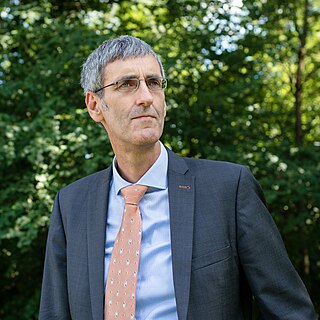
The Max Planck Society for the Advancement of Science is a formally independent non-governmental and non-profit association of German research institutes. Founded in 1911 as the Kaiser Wilhelm Society, it was renamed to the Max Planck Society in 1948 in honor of its former president, theoretical physicist Max Planck. The society is funded by the federal and state governments of Germany.
The Max Planck Institute for Extraterrestrial Physics is part of the Max Planck Society, located in Garching, near Munich, Germany. In 1991 the Max Planck Institute for Physics and Astrophysics split up into the Max Planck Institute for Extraterrestrial Physics, the Max Planck Institute for Physics and the Max Planck Institute for Astrophysics. The Max Planck Institute for Extraterrestrial Physics was founded as sub-institute in 1963. The scientific activities of the institute are mostly devoted to astrophysics with telescopes orbiting in space. A large amount of the resources are spent for studying black holes in the galaxy and in the remote universe.

Garching bei München or Garching is a city in Bavaria, near Munich. It is the home of several research institutes and university departments, located at Campus Garching.

The Max Planck Institute for Gravitational Physics is a Max Planck Institute whose research is aimed at investigating Einstein's theory of relativity and beyond: Mathematics, quantum gravity, astrophysical relativity, and gravitational-wave astronomy. The institute was founded in 1995 and is located in the Potsdam Science Park in Golm, Potsdam and in Hannover where it closely collaborates with the Leibniz University Hannover. Both the Potsdam and the Hannover parts of the institute are organized in three research departments and host a number of independent research groups.

The Max Planck Institute for Physics (MPP) is a physics institute in Munich, Germany that specializes in high energy physics and astroparticle physics. It is part of the Max-Planck-Gesellschaft and is also known as the Werner Heisenberg Institute, after its first director in its current location.

The Max-Planck-Institut für Astronomie is a research institute of the Max Planck Society (MPG). It is located in Heidelberg, Baden-Württemberg, Germany near the top of the Königstuhl, adjacent to the historic Landessternwarte Heidelberg-Königstuhl astronomical observatory. The institute primarily conducts basic research in the natural sciences in the field of astronomy.

The Gottfried Wilhelm Leibniz Prize, or Leibniz Prize, is awarded by the German Research Foundation to "exceptional scientists and academics for their outstanding achievements in the field of research". Since 1986, up to ten prizes have been awarded annually to individuals or research groups working at a research institution in Germany or at a German research institution abroad. It is considered the most important research award in Germany.
The International Max Planck Research School for Molecules of Life is a German centre for postgraduate training and research in life sciences. It is one among over 60 International Max Planck Research Schools in Germany. It is located in Munich and was established in 2005. The Ph.D. program is operated by the Max Planck Institute of Biochemistry and works in close collaboration with the Max Planck Institute for Biological Intelligence and two universities in Munich.
Guinevere Alice Mei-Ing Kauffmann was born in California. She is an astrophysicist and is known for her work studying galaxies among other subjects.

Reinhard Genzel is a German astrophysicist, co-director of the Max Planck Institute for Extraterrestrial Physics, a professor at LMU and an emeritus professor at the University of California, Berkeley. He was awarded the 2020 Nobel Prize in Physics "for the discovery of a supermassive compact object at the centre of our galaxy", which he shared with Andrea Ghez and Roger Penrose. In a 2021 interview given to Federal University of Pará in Brazil, Genzel recalls his journey as a physicist; the influence of his father, Ludwig Genzel; his experiences working with Charles H. Townes; and more.

The Max-Planck-Institute of Quantum Optics is a part of the Max Planck Society which operates 87 research facilities in Germany.

Simon David Manton White, FRS, is a British astrophysicist. He was one of directors at the Max Planck Institute for Astrophysics before his retirement in late 2019.
Rudolf Kippenhahn was a German astrophysicist and science author.
Friedrich-Karl "Friedel“ Thielemann is a German-Swiss theoretical astrophysicist.
Anna Louise Watts is a Professor of Astrophysics at the University of Amsterdam. She studies neutron stars and their thermonuclear explosions.
Claudia Maraston is a Professor of Astrophysics at the University of Portsmouth. She designs models for the calculation of spectro-photometric evolution of stellar populations. She is the winner of the 2018 Royal Astronomical Society Eddington Medal.
Selma de Mink is a Dutch astrophysicist specializing in evolution of stars, stellar binary systems and compact objects, including black holes. She is a scientific director at the Max Planck Institute for Astrophysics in Garching near Munich, Germany.

Frank Eisenhauer is a German astronomer and astrophysicist, a director of the Max Planck Institute for Extraterrestrial Physics (MPE), and a professor at Technical University of Munich. He is best known for his contributions to interferometry and spectroscopy and the study of the black hole at the centre of the Milky Way.
Paola Caselli is an Italian astronomer and astrochemist known for her research on molecular clouds, star formation and planet formation, and the astrochemistry behind the materials found within the Solar System. She is the director of the Max Planck Institute for Extraterrestrial Physics near Munich in Germany. She also holds an honorary professorship at Ludwig Maximilian University of Munich.











